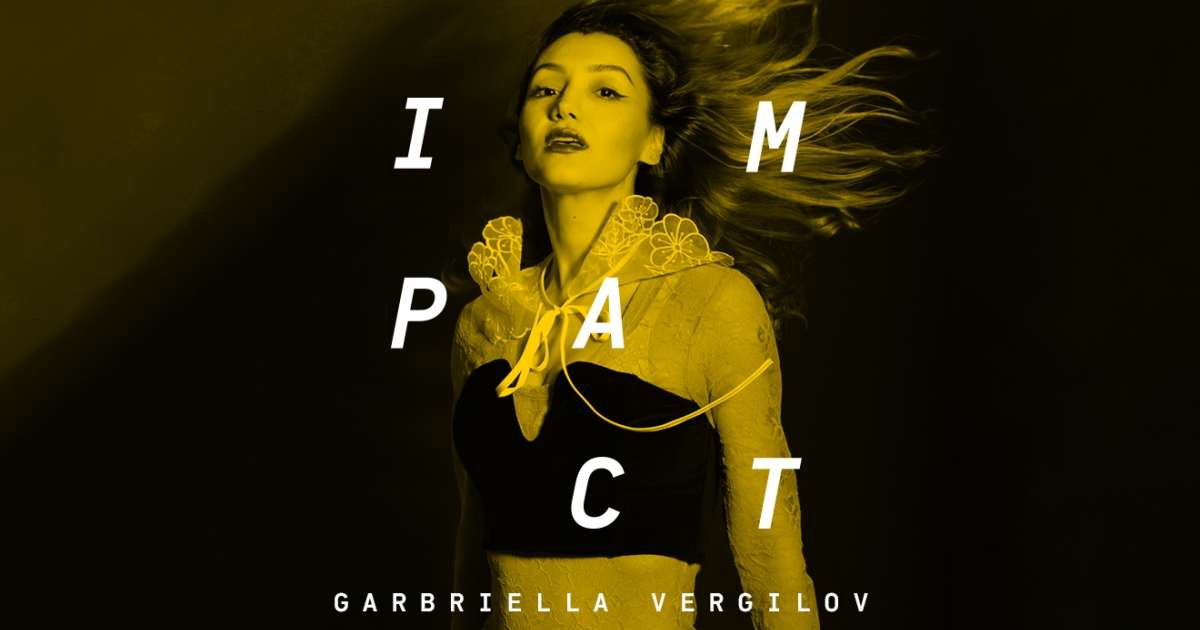“Telling my story”: Gabriella Vergilov is the Bulgarian techno DJ pouring herself into music – Mixmag

What triggered you to make the leap of trying DJing and producing for yourself?
I was inspired to buy gear after visiting a friend of mine in Berlin. I was staying with him and it was the first time I saw his studio, which looked like a spaceship with all kinds of classic amazing instruments. He had the 808, 909, 707, 303 and at least 10 keyboard synths, tons of pedals and some modular synths. Just a couple of hours before I arrived on his doorstep, a Roland TR-8 had been delivered and he was one of the first people in Germany to have it. So we were sitting on the sofa in the living room. He brought his laptop, connected the drum machine to it, added the Roland 303, put it in my lap and said: “Come on, give it a go” so I started jamming. And I was like, I want to have this at my home! A couple of months later I ordered my instruments and I pretty much copied his mini setup. I bought a microKORG with a little microphone, the Roland TR-8 drum machine, and a replica of the Roland 303 acid machine. It looks exactly the same, the sound is pretty nasty like the real one, it’s just a budget version. I instantly fell in love with the synths and the ability to create any kind of sound you wanted…I was obsessed. It was actually one of the happiest times in my life, I see it now as the pillar for my growth as a musician and as a music producer. Music has given me so much and I’m grateful for these moments and the people who introduced me to all of this.
Would you say that you took more naturally to DJing or producing?
I procrastinated with DJing. I wanted to be a vinyl-only DJ and do things properly. And for me “properly” meant knowing the technicalities and being trained to the highest level. I still have only turntables at home and no CDJs. I learned how to play digitally in clubs, I never practised, but the switch was super easy because I had already been playing records for three years. But it took me a whole year to say yes to a gig. The producing part was quite natural, because knowing theory, rhythm, harmony and having played piano previously helped immensely. I’m self-taught. I literally had two people come over, one of whom was Bjarki, to show me how to connect my machines, connect my sound card, make a loop, and use EQ, that was it. I have never watched a single tutorial, I like to learn through trial and error. I’m very intuitive and I approach music production like composing. I rely heavily on what feels good in the moment and aim for a cinematic feel. The technical part I just leave to the mixing and mastering engineers. So producing was really organic and a lot of fun.
How long after buying the equipment did you put out your first release?
I don’t remember the year but I remember the month — it was June when my gear arrived, and in October I already started sending music to people. The New York label Thema Recordings picked a few tracks and said, “let’s release you.” I had tears in my eyes when they asked me. I couldn’t believe that I “deserved” the recognition. That’s connected to my depression and battling with low self-esteem for many years. Low self-esteem is very common in people who have melancholia, depression or ADHD, I just didn’t know that at the time. I would often hear from my peers “you should believe in yourself a little bit more, cut yourself some slack”. I didn’t know what that meant until I started therapy. My self-worth has improved in a healthy way and I am grateful I am finally healing. It’s been a journey though.
When would you say your depression started?
I think it was in my childhood, but I only just realised that I was not aligned with my emotions around six or seven years ago when I started DJing and producing. I made choices regarding my career that weren’t even aligned with what I actually wanted. I was not able to say no, because when you are kind of emotionally challenged, you feel these extremes, like, “Oh, if it’s a no then it’s the end of the world.” Impostor syndrome plays into it too, and that prevents you from manifesting your full potential. It’s only recently I’ve realised that the choices we make really define who we are. I made a track about it.
Read this next: The Third Wave: Economic recovery has reignited Sofia’s party scene
You put out your first release in 2016. Were you already starting to play DJ gigs at that time?
Yes. In 2017 I moved to Berlin for a year. The plan was to make the most out of being in the city and play as much as possible. While I lived in Copenhagen, I would take the bus, an eight hour trip, on Friday night or Saturday morning depending on when I was finishing work, and I’d have the full weekend in Berlin. I got to know a lot of people. Also I’d always be dancing front row when artists from Berlin came to play in Copenhagen. I’ve watched Ben Klock DJ in front of me at least 50 times. One day I got this offer, “Do you want to play the Culture Box in Copenhagen?” Ben Klock was playing the main room and it would be me and someone else in the other room. But I said no to that first gig because I didn’t feel quite ready yet. I didn’t want to make a fool of myself. I was still doing vinyl-only sets and the promoter wanted me to play a digital set. He was convinced I needed just a single session to be ready for the gig. I was happy he believed in me, but I didn’t want the pressure of trying to be perfect without the time to prepare. A lot of people from the scene were like, “Are you fucking crazy?!” It wasn’t long after that I got booked to play a major festival in Belgium together with three of my favourites on the same stage on the same day — Ben Klock, Jeff Mills and Richie Hawtin. That was my way of saying, “Look, I know what I’m doing.” It was actually Ben Klock who supported me early and was playing my productions. He dropped my track ‘Her Beginning’ in his set at Berghain. It’s not a standard techno tune at all, more of a sensual, mellow house track. This was massive for me, I cried on that dancefloor. It felt like the universe was telling me that it’s good to take your time, put in the work and trust your intuition.
What would you say has been like a career highlight for you production wise and also as a DJ?
As a DJ, definitely my two Boiler Rooms. When I did the one in 2019 I was the first female from Bulgaria to be booked with the platform and only the second artist from my homeland. The other one was in 2021 in Sofia. It was crazy, I was like the Bulgarian ambassador for Boiler Room at this point and they were really excited to see me. It was the first edition in Bulgaria, so it felt like a big deal for the whole scene, not only for me. Production-wise, I think the support of DVS1 has been really important. Ever since I’ve been releasing music, he’s been playing it constantly. Ben Klock and Ben Sims have supported me too. When some of your heroes actually acknowledge your talent it feels like you’re on the right path.
What’s next for you?
I just came back from Sofia. I did the closing rave for KvARTal festival celebrating the oldest art district of the city and its culture. It was emotional, I was brought back for three encores which resulted in a four-hour set instead of two-and-a-half-hours as planned. I was a guest of honour for the second year running. I’ve also just confirmed my first big conceptual event series called GIRLS WILL BE GIRLS. It’s a two-day event at the end of October, entirely focused on female empowerment and mental health. There’ll be a rave with all-women DJs, an interactive brunch for those who identify as women, an open discussion, readings of love poetry, a fashion-beauty-cocktail corner, live music, a drag queen show, and more. There is a big problem with toxic masculinity, violence against women and also LGBTQI rights in Bulgaria. It is not particularly safe for drag queens either. But this will be a safe and fun haven for all. I started developing the idea in 2020 and now I’m finally doing it. The support has already been immense.
So now that you’ve reached a certain profile in Bulgaria, you feel like you’re in the position to give back.
I was bullied when I was a teenager and ever since then I’ve tried to stick up for others who are the victim of bullies. I know what it feels like to be excluded and made fun of. It’s sad, but I still feel people are heavily intimidated by women full of pure energy. I’ve always been true to myself and I feel like I’m finally in a position where my voice is being credited more and more, both in Copenhagen and Sofia. That’s what I want to share with people; I haven’t had much help, but you can still get there in the end. I want to tell people that even when you feel like the world is against you, you have to put yourself out there. Nobody else is going to do it for you. I’m a child of the hustle culture — not just the global hustle culture, but having to battle with the mentality of where I come from.
The geopolitics in the Balkans are turbulent and that can make your life unpredictable. Living in unpredictability and in a dysfunctional society can be very discouraging for creative people. Combine that with battling depression from a very early age, which evolved into complex PTSD… and this is even tougher if you’re a woman, especially if you’ve experienced abuse. This is what my upcoming album is about, all the things that shape our perception of who we are and our sense of love and acceptance.
So we can look forward to hearing a more personal side of you on the album?
Yes! I respect colleagues who want to stay away from the spotlight and don’t want to talk about what’s inside of them. But when I’m doing a DJ set and people love the tracks I play, they’re loving the story that I’m telling and not just the tracks. And that story wouldn’t be possible if I hadn’t gotten through what I’ve gotten through in my life, if I hadn’t experienced what I’ve experienced. That includes the people I meet, the people I fall in and out of love with, the difficulties in my family, friendships, career, everything. All of that makes me hunt for a certain type of music that reflects both my mood and my taste, and this is what I bring to the DJ booth as well. In my opinion, people connect with DJs, and with performers generally because we base our musical performance on our personal story in a way. But sharing it can be quite frightening. I had a panic attack a couple of months ago. I said to my friend, “I’m very scared about releasing the album and it’s not a fear of failure, it’s something else I can’t define.” He said, “You’ve made a very private, personal piece of music. You’re scared because you’re about to reveal a part of yourself that hasn’t been seen before, and that’s a big step.” And he was right. I believe in the album more than anything else in the world. It’s me, telling my story.
GIRLS WILL BE GIRLS is happening on October 27 in Sofia
Annabel Ross is a freelance writer, follow her on Twitter



-kBFC--1920x1080@Las%20Provincias.jpg)
:quality(85)/cloudfront-us-east-1.images.arcpublishing.com/infobae/G5UB55DDW5EPRK5H4VG6CKCYPA.jpg)